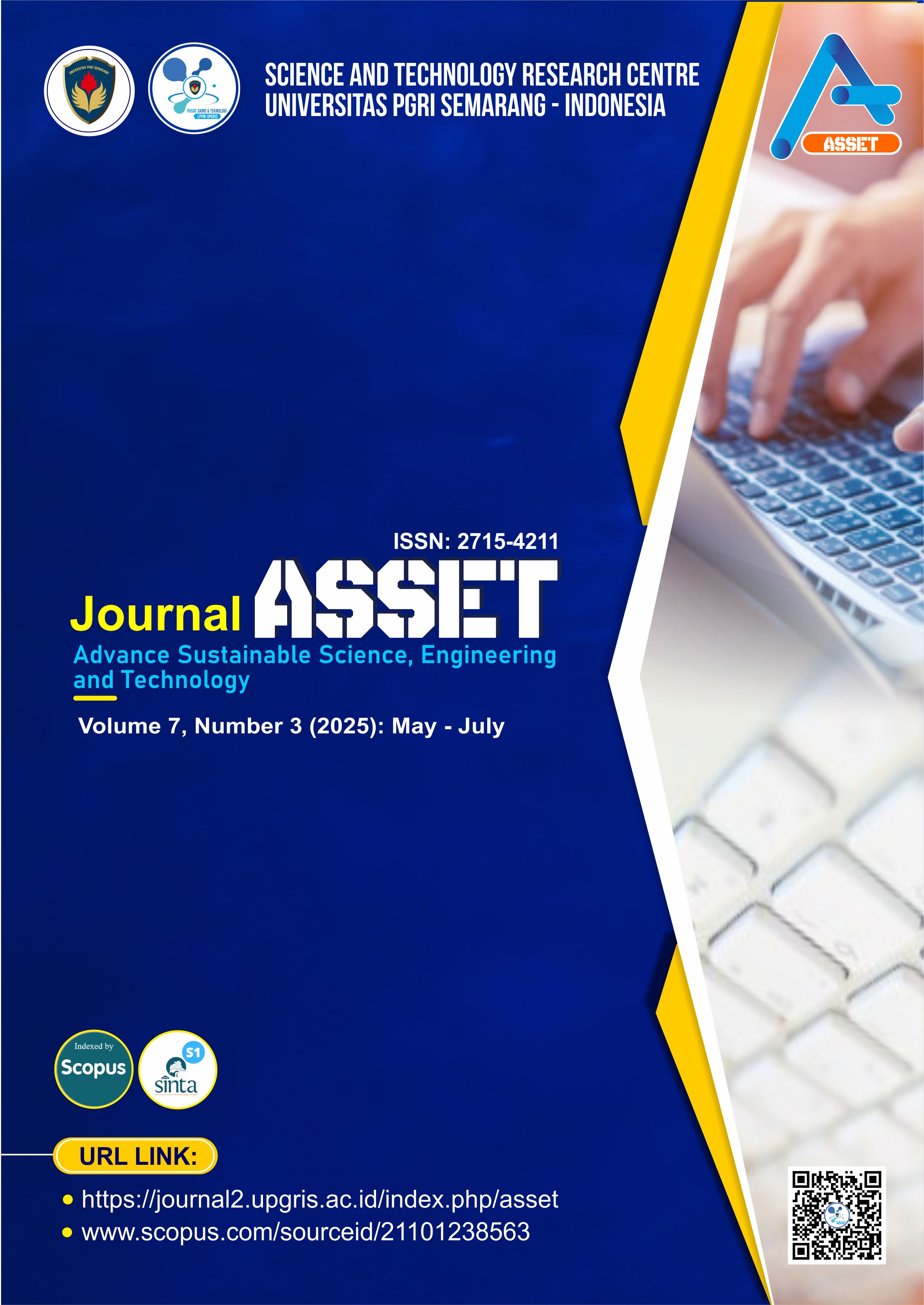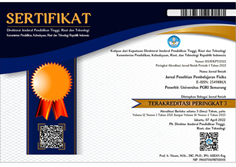AI-Enabled CTAS and Digital Tax-Fraud Detection: A PLS-SEM Study in Indonesia
DOI:
https://doi.org/10.26877/asset.v7i4.2609Keywords:
anomaly detection, ctas, digital governance, fraud detection, tax administrationAbstract
This study investigates the factors determining digital tax fraud based on the New Fraud Star Theory, with great emphasis on the moderating role of AI-empowered CTAS. Data were collected from 107 corporate taxpayers in Indonesia through a structured survey and analyzed using Partial Least Squares Structural Equation Modeling. The results indicated that System Pressure, Technological Capability, and External Digital Pressure significantly heightened fraud attempts, while Digital Opportunity, AI Rationalization, Cyber Arrogance, Internal IT Governance, and Techno-Culture were not significant. The model explained a substantial variance in the effectiveness of fraud detection with R² = 0.723. Moderation analysis showed that AI-powered CTAS significantly weakened the effects of System Pressure (X1×CTAS), Technological Capability (X4×CTAS), Internal IT Governance (X6×CTAS), and External Digital Pressure (X7×CTAS). These findings identify CTAS's strategic role in improving compliance by enabling real-time data integration, anomaly detection rules, and strengthened access control. Implications are that digital governance reforms should give full attention to the establishment of robust AI-empowered monitoring systems to minimize the risk of tax fraud effectively.
References
[1] Angeli A., Lattarulo P., Palmieri E., Pazienza M.G. Digital Fraud Detection Effectiveness and tax amnesties in regional taxation. Econ Polit. 2023. https://doi.org/10.1007/s40888-023-00297-9
[2] Miao S., Wen F. The impact of the organisational structure of tax authorities on tax and accounting fraud. Accounting & Finance. 2024;64(3):2735-2758. https://doi.org/10.1111/acfi.13232
[3] Jiang H., Hu W., Jiang P. Does ESG performance affect corporate tax avoidance? Evidence from China. Finance Research Letters. 2024;61:105056. https://doi.org/10.1016/j.frl.2024.105056
[4] Pandey K., Yadav S.S., Sharma S. Drivers of tax avoidance by MNEs in the developing countries under the digital economy: a modified-TISM approach. Journal of Advances in Management Research. 2023;20(5):896-919. https://doi.org/10.1108/JAMR-02-2023-0025
[5] Darmayasa I.N., Hardika N.S. Core tax administration system: the power and trust dimensions of slippery slope framework tax compliance model. Cogent Business & Management. 2024;11(1):2337358. https://doi.org/10.1080/23311975.2024.2337358
[6] Sukmadilaga C., Winarningsih S., Handayani T., Herianti E., Ghani E.K. Fraudulent financial reporting in ministerial and governmental institutions in Indonesia: An analysis using hexagon theory. Economies. 2022;10(4):86. https://doi.org/10.3390/economies10040086
[7] Matute J., Sánchez-Torelló J.L., Palau-Saumell R. The influence of organizations’ tax avoidance practices on consumers’ behavior: The role of moral reasoning strategies, political ideology, and brand identification. Journal of Business Ethics. 2021;174(2):369-386. https://doi.org/10.1007/s10551-020-04610-5
[8] Tsai P.H., Liu Y., Liu X. Collusion, political connection, and tax avoidance in China. Kyklos. 2021;74(3):417-441. https://doi.org/10.1111/kykl.12265
[9] Achmad T., Ghozali I., Pamungkas I.D. Detecting Fraudulent Financial Statements with Analysis Fraud Hexagon: Evidence from State-Owned Enterprises Indonesia. WSEAS Transactions on Business and Economics. 2024;21:2314-2323. https://doi.org/10.37394/23207.2024.21.190
[10] Monteverde V.H. New fraud star theory and behavioural sciences. Journal of Financial Crime. 2023;30(4):983-998. https://doi.org/10.1108/JFC-06-2020-0114
[11] Ajeigbe K.B., Ganda F., Enowkenwa R.O. Impact of sustainable tax revenue and expenditure on the achievement of sustainable development goals in some selected African countries. Environment, Development and Sustainability. 2024;26(10):26287-26311. https://doi.org/10.1007/s10668-023-03730-y
[12] Chami R., Darkey E., Williams O. A time to build: Does technical assistance matter for revenue mobilization?. International Economics. 2022;172:324-330. https://doi.org/10.1016/j.inteco.2021.11.003
[13] Barros V., Jalles J.T., Sarmento J.M. Drivers of the tax effort: evidence from a large panel. Comparative Economic Studies. 2023;65(1):96-136. https://doi.org/10.1057/s41294-022-00187-2
[14] Hesami S., Jenkins H., Jenkins G.P. Digital transformation of tax administration and compliance: A systematic literature review on E-Invoicing and prefilled returns. Digital Government: Research and Practice. 2024;5(3):1-20. https://doi.org/10.1145/3643687
[15] Sinaga S.T., Ekananda M., Gitaharie B.Y., Setyowati M. Tax Buoyancy in Indonesia: An Evaluation of Tax Structure and Policy Reforms. Economies. 2023;11(12):294. https://doi.org/10.3390/economies11120294
[16] Ponomareva K.A.R.I.N.A. Tax challenges arising from the digitalisation of the economy: The development of the OECD project and possible implementation in Russia. BRICS Law Journal. 2022;9(4):41-63. https://doi.org/10.21684/2412-2343-2022-9-4-41-63
[17] Chin Y.C., Zhao J. Governing cross-border data flows: International trade agreements and their limits. Laws. 2022;11(4):63. https://doi.org/10.3390/laws11040063
[18] Mohamad Ariff A., Kamarudin K.A., Musa A.Z., Mohamad N.A. Financial constraints, corporate tax avoidance and environmental, social and governance performance. Corporate Governance: The International Journal of Business in Society. 2024;24(7):1525-1546. https://doi.org/10.1108/CG-08-2023-0343
[19] Ratmono D., Frendy. Examining the fraud diamond theory through ethical culture variables: A study of regional development banks in Indonesia. Cogent Business & Management. 2022;9(1):2117161. https://doi.org/10.1080/23311975.2022.2117161
[20] F. Rasheed, J. Said, and N. I. Khan, “Evolution of fraud related theories: A theoretical review,” J. Nusantara Stud. (JONUS), vol. 8, no. 3, pp. 322–350, 2023, https://doi.org/10.24200/jonus.vol8iss3pp322-350
[21] Afjal M., Salamzadeh A., Dana L.P. Financial fraud and credit risk: Illicit practices and their impact on banking stability. Journal of Risk and Financial Management. 2023;16(9):386. https://doi.org/10.3390/jrfm16090386
[22] Tsindeliani I., Matyanova E., Razgildeev A., Vasilyeva E., Dudnik D., Mikhailova A. Tax optimization in the modern tax system under the influence of digitalization: Russian case study. European Journal of Comparative Law and Governance. 2021;8(4):429-452. https://doi.org/10.1163/22134514-bja10022
[23] I. N. Darmayasa, I. Arsana, and I. Putrayasa, “Reconstruction of the slippery slope framework tax compliance model,” ACRN J. Finance Risk Perspect., vol. 11, no. 1, pp. 19–32, 2022, https://doi.org/10.35944/jofrp.2022.11.1.002
[24] O. A. Gansser and C. S. Reich, “Influence of the new ecological paradigm (NEP) and environmental concerns on pro-environmental behavioral intention based on the theory of planned behavior (TPB),” J. Cleaner Prod., vol. 382, p. 134629, 2023, https://doi.org/10.1016/j.jclepro.2022.134629
[25] Li Y., Al-Sulaiti K., Dongling W., Abbas J., Al-Sulaiti I. Tax avoidance culture and employees' behavior affect sustainable business performance: the moderating role of corporate social responsibility. Frontiers in Environmental Science. 2022;10:964410. https://doi.org/10.3389/fenvs.2022.964410
[26] T. Chung, P. N. Sharma, C. C. Lee, and J. Pinto, “National culture and occupational fraud magnitude: the moderating role of fraud type,” J. Forensic Account. Res., vol. 6, no. 1, pp. 406–435, 2021, https://doi.org/10.2308/JFAR-2020-025.
[27] L. Huang, “Quantifying taxation policy effectiveness: The mediating role of big data and the moderating influence of digitalization,” J. Internet Serv. Inf. Secur., vol. 14, no. 4, pp. 100–115, 2024, https://doi.org/10.58346/JISIS.2024.I4.009
[28] Wenwu X., Khurram M.U., Qing L., Rafiq A. Management equity incentives and corporate tax avoidance: Moderating role of the internal control. Frontiers in psychology. 2023;14:1096674. https://doi.org/10.3389/fpsyg.2023.1096674
[29] Koay G.Y., Sapiei N.S. The role of corporate governance on corporate tax avoidance: a developing country perspective. Journal of Accounting in Emerging Economies. 2025;15(1):84-105. https://doi.org/10.1108/JAEE-01-2023-0022
[30] Nedopil C. Integrating biodiversity into financial decision‐making: Challenges and four principles. Business Strategy and the Environment. 2023;32(4):1619-1633. https://doi.org/10.1002/bse.3208
[31] Sánchez-Ballesta J.P., Yagüe J. Does tax avoidance affect productivity in SMEs?. Management Decision. 2024;62(10):3261-3285. https://doi.org/10.1108/MD-07-2023-1159
[32] Qi Y., Che Azmi A. Factors affecting electronic invoice adoption and tax compliance process efficiency. Transforming Government: People, Process and Policy. 2021;15(1):150-168. https://doi.org/10.1108/TG-04-2020-0070
[33] Kryeziu L., Krasniqi B.A., Bağış M., Hajrullahu V., Zhushi G., Bytyçi D., Ismajli M. The effects of institutions, firm-level factors and rational decision-making on entrepreneurial behaviors of MSMEs: lessons and opportunities for transition communities. Journal of Enterprising Communities: People and Places in the Global Economy. 2024;18(4):771-797. https://doi.org/10.1108/JEC-05-2023-0075
[34] Cahyadini A., Hutagalung J.I.G., Muttaqin Z. The urgency of reforming Indonesia’s tax Law in the face of economic digitalization. Cogent Social Sciences. 2023;9(2):2285242. https://doi.org/10.1080/23311886.2023.2285242
[35] E. Edeh, W. J. Lo, and J. Khojasteh, “Review of Partial Least Squares Structural Equation Modeling (PLS-SEM) using R: A Workbook: By Joseph F. Hair Jr., G. Tomas M. Hult, Christian M. Ringle, Marko Sarstedt, Nicholas P. Danks, Soumya Ray,” Cham, Switzerland: Springer, pp. 197, Open Access; €59.99, Hardcover Book, 2023, https://doi.org/10.1080/10705511.2022.2108813
[36] Anirvinna C., Goodwin R.D. An empirical assessment of technological advancements on supply chain management performance: a mixed-methods sem approach using smartpls. Operations Management Research. 2025;1-25. https://doi.org/10.1007/s12063-025-00556-x
[37] Blaufus K., Jarzembski J.K., Reineke J., Trenn I. Public disclosure of tax strategies and firm’s actual tax policy. Journal of Accounting, Auditing & Finance. 2025;40(3):863-887. https://doi.org/10.1177/0148558X231200913











